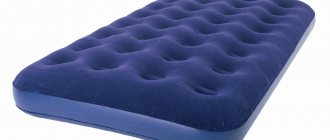Mattress lifespan
Each item has a certain service life, depending on a number of factors. Mattresses are no exception, and therefore require periodic replacement. What is the service life of a particular mattress and how does it depend on the materials used for its production? There is a direct relationship between these factors that must be taken into account.
Unfortunately, many people sleep on the same mattress for 15-20 years or more. The surface of the product may be heavily dented, so it may simply be unsafe to use.
Note that even the highest quality and most expensive mattresses lose their original characteristics after 10-15 years and require mandatory replacement. On average, experts advise replacing them every 7-8 years, but much depends on the build of people. The fact is that sweat is absorbed into the mattress and particles of dead skin become clogged. This stimulates the development of dust mites, fungi and other harmful microorganisms that provoke the development of eczema, asthma, and allergic reactions.
The optimal service life of an adult or children's mattress depends on the materials used for its manufacture:
- Latex models can last up to 15-20 years, depending on the care of the owners.
- Mattresses with independent spring blocks last up to 10-15 years. Note that the springs may not be pressed through or damaged, but the filler will lose its primary properties.
- Spring-type products can last up to 5-7 years, after which depressed areas and even squeaking will begin to appear.
- Foam mattresses are replaced after 2-6 years.
- Cotton mattresses are short-lived and last only 2-3 years, but they are also cheaper than others.
Practice shows that mattresses made from loose polyurethane foam (below 25 density units), products with polyurethane foam as a filler and models with sparse independent spring blocks last the least.
What does the mattress warranty cover?
The minimum service life is indicated in the warranty conditions assigned to this category of goods by the state. It is one and a half years, or 18 months.
No manufacturer can give a lesser guarantee. Subject to fair use in compliance with all the rules specified by the seller, the buyer can easily obtain protection of his rights during this time. You can read about how not to lose your right to a guarantee here. If a claim submitted to the seller receives an unreasonable refusal, you need to go to court. A marriage company can deliberately issue deliberately unlawful refusals, since it has statistics favorable to itself: an insignificant percentage of buyers of low-quality mattresses go to court. People do not want to deal with the judicial procedure; they are afraid of additional costs for the examination. But here's what you need to know about her:
- It is not only not necessary to carry out an independent examination of the mattress during the warranty period, it is simply impossible to do it. Its results may not be taken into account by the manufacturer and the court will not compensate for these costs.
- During the court hearing, an objective examination will be appointed, which will reveal manufacturing defects.
How does an extended warranty work when purchasing a mattress?
The extended warranty that many companies offer subject to certain conditions deserves a separate discussion . Most often, to obtain it you need to buy an additional product at a fairly high price. But such a guarantee itself often contains a catch. For example, when purchasing a mattress from Askona, you will be offered a protective cover, and upon purchase they will promise an extended warranty of up to 25 or 30 years, depending on the model chosen. But by carefully reading the contract, you will notice that you will not be guaranteed the same service life of the mattress. Only the company's commitment to the integrity of the spring unit will last 25 years or more. Such a guarantee does not talk about damage to the layers of filler or cover, or about maintaining the geometry of the mattress. Some companies, for example Toris, guarantee the indefinite operation of springs and without imposing additional conditions. But if you do decide to purchase an extended mattress warranty, be sure to keep proof of your rights. In reviews of mattresses, there are often complaints that the increase in the warranty period upon purchase is not fixed by the seller.
What happens if you don't change the mattress?
When a foam, innerspring, or any other mattress reaches the end of its lifespan, you'll want to replace it. Otherwise. you will begin to suffer from the following unpleasant factors:
- Allergic and respiratory diseases. Old mattresses harbor microscopic insects, including bed mites, which multiply for years and remain undetected. They cause irreparable harm to people's health.
- Smell. If you haven't changed your mattress in a while, smell it. It is possible that the product will emit an unpleasant odor due to smoldering and rotting of the internal layers under the influence of absorbed moisture.
- Extraneous sounds. When you get out of bed, you can hear an unpleasant characteristic squeak from the mattress on the bed. This indicates deformation of the springs, and the situation can be corrected by replacing the product with a new one.
- Back problems. The main problem that arises when using one mattress for a long time is back pathology. My head starts to hurt. Stiff neck, numb hands. All these signs indicate that the mattress needs urgent replacement.
Be attentive to your health and do not forget that it is much cheaper to replace a mattress that has served its useful life than to engage in lengthy and expensive treatment in the future.
Why people are in no hurry to change mattresses
Many people are in no hurry to change their mattress, preferring to spend the family budget on what they consider to be more important things. For example, to buy a new smartphone or TV. This is what brings pleasant emotions “here and now.” Think of the purchase of a new mattress as a long-term investment in your health and quality of life, because the right sleeping place will significantly improve your rest! A well-rested person is more energetic and productive. There is another reason. It is not always obvious that a mattress has served its purpose, even if there are no dents on it and it looks like new. Below are signs that will help you know if it's time to change your mattress.
How to extend the life of a mattress?
To extend the life of spring and springless mattresses, you can use several simple tricks:
- Buy a mattress protector that fits over the product and protects it from dirt, moisture, dust and water.
- Consider the maximum load on the sleeping place and do not exceed it.
- Constantly ventilate the bedroom, and along with it the mattress.
- Change the bedding on your bed regularly - at least every week, but more often is better.
- Don't let children jump on the bed.
- Clean the mattress periodically using a vacuum cleaner.
- Turn the product over periodically so that its surfaces wear evenly. It is recommended to do this at least once every 1-2 weeks.
Now you know the dangers of sleeping on a mattress that has expired, and you also know the approximate service life of different products. Remember this information about coconut, spring and springless mattresses, and use it to promptly replace the product to avoid health problems.
How often should you change your mattress?
If you're wondering if it's time to change your mattress, it probably is. There is no set rule, but if your mattress becomes uncomfortable or shows obvious signs of wear and tear, it is probably best to find a replacement.
General recommendations
The average lifespan of a mattress is about eight years. Depending on the quality and type of your model, you may receive a little more or less time. What types of mattresses are there?
Spring-loaded.
High-quality independent springs can last up to 10 years, sometimes longer: if the mattress is double-sided and can be turned over for even wear.
Foam, with memory effect.
The material and density of the foam will determine how many nights the mattress will last you. With proper care, you can predict 10 to 15 years.
Latex.
It all depends on whether the latex is natural or synthetic. Some of the first ones have a guarantee of 20, and even 25 years.
Hybrid.
Such mattresses are a complex structure of several layers: foam and springs, and here everything is determined by the quality of the component parts.
With a "pillow" on top.
The extra padding seems like it should help, but it breaks down over time and can make the sleeping surface lumpy sooner than a regular mattress would.
Water.
Although this type of mattress is not very popular now, let us mention them: they can last from 5 to 10 years.
Pictured is the Blue Sleep Hybrid mattress, branded Hybrid pillows in Blue Sleep bedding
Why is it time for you to change your mattress?
Only wine gets better with age. The mattress, no matter how good and expensive it is, eventually loses its shape, and dips and lumps do not contribute to good sleep.
Additionally, over time, mattresses accumulate dust mites and other allergens, which are especially dangerous for people with allergies, asthma, and other respiratory conditions.
The photo shows an orthopedic hybrid mattress Blue Sleep (with microsprings and a combination of foams)
How do you know when it's time to change your mattress?
If you notice any of the following signs (or more than one), the time has come.
1) Wear level.
Your mattress will not last if you fall into holes and feel lumps and coils of springs on your back.
2) Extraneous noise.
Springs that squeak when you move mean they are worn out and no longer provide the support you need.
3) Body pain.
When the mattress becomes uncomfortable and no longer supports the body as it did in the beginning, you begin to wake up with a feeling of stiffness in your neck, back and muscles.
4) Allergies or asthma are getting worse.
Vacuuming and regular cleaning help for a while, but if symptoms persist, changes are needed.
5) You wake up when your partner rolls over.
An old mattress is no longer able to absorb impulses from extraneous movements.
6) The load has changed.
Have you gained weight or found a permanent partner? It is worth checking what weight limit the mattress had.
In the photo there is a Blue Sleep mattress, a branded Duvet blanket in a duvet cover from the Blue Sleep set
How to extend the life of a mattress?
Nothing lasts forever, but if you treat your mattress with more care, it may last a little longer.
- Use a mattress cover to protect against moisture, dust and other contaminants.
- Make sure that the mattress and bed are the right size for each other and that nothing is sagging or bending.
- Rotate your mattress every 3-6 months to ensure even wear.
- Clean your mattress according to the manufacturer's directions.
- Ventilate the bedroom periodically to reduce the concentration of dust and moisture.
- When moving, keep the mattress upright to prevent squeezing and damaging the springs.
- Keep pets away from the bed to prevent them from scratching or chewing anything.
- Do not allow children to jump on the bed as this may damage the springs and other parts of the mattress.
- Remove the sheets and cover from time to time to air out the mattress.
Regular cleaning will help minimize the risk of allergens and dust mites. Sprinkle baking soda on your mattress and vacuum it after 24 hours to remove moisture and odors. Mattresses should be cleaned once a year.
Can you tell me more about turning over?
This advice applies to double-sided mattresses. Most of the models currently produced (memory foam, for example) are one-sided and do not need such tricks.
conclusions
You spend about a third of your life in bed, and a good night's sleep is essential to your health. Keep this in mind when you decide to put up with an uncomfortable mattress a little longer. A simple change can have a positive impact on your back, nerves and airway. If pain and other unpleasant symptoms do not stop, be sure to talk to your doctor.
Now you know everything about how to make your night's rest comfortable.
Pleasant dreams!
How to understand that it’s time to change your mattress: 7 signs
Of course, if your mattress is already 8 years old or more, you should think about replacing it. But since the lifespan of mattresses depends on several factors, the main indicator remains the quality of your sleep. The National Sleep Foundation recommends replacing your mattress in the following situations.
- You stopped getting enough sleep. You may have started to notice that you sleep better in hotels or at a party than at home.
- You feel like the mattress is sagging. For example, dents could form in the middle, causing the sleeper to roll toward the center.
- You wake up with body pain. One of the reasons for morning discomfort can be dents in the mattress. Because of them, the bedding does not provide sufficient support for a comfortable sleep.
- You or your partner toss and turn in bed all night or cannot find a comfortable position for a long time.
- Allergy or asthma symptoms have worsened. Dust mites and allergens accumulate in the mattress. If vacuuming and regular cleaning don't help improve the situation, it's time to think about buying a new mattress.
- You began to feel your partner's movements at night more than before. For example, if your roommate turns over, a wave goes across the entire bed and you wake up.
- The mattress began to creak. This may indicate that the springs are worn out and no longer provide adequate support to your body.
If the above symptoms of mattress death do not suit you, then most likely it is ready to protect your healthy sleep for several more years.











